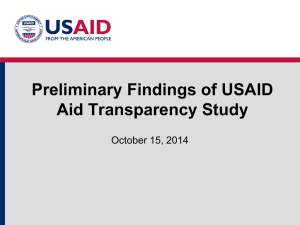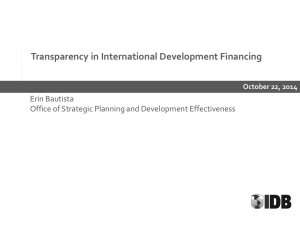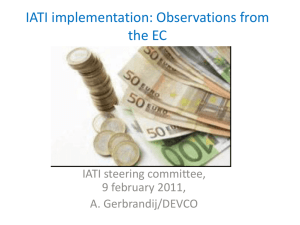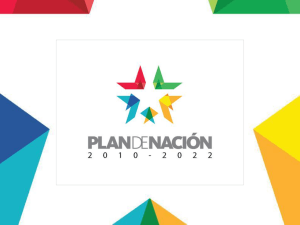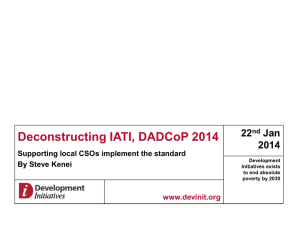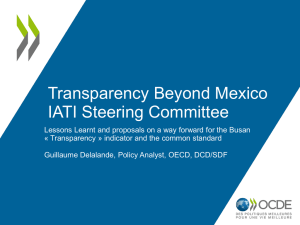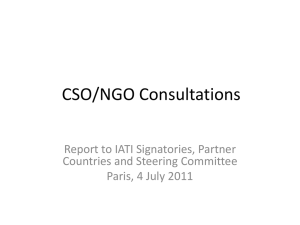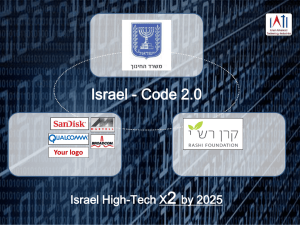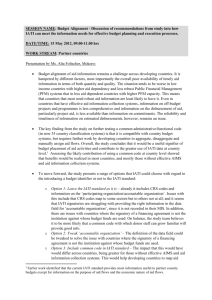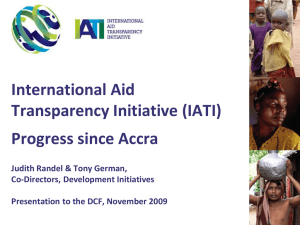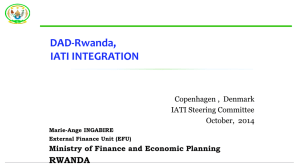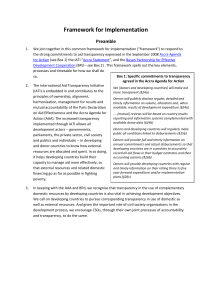File - Muskoka
advertisement
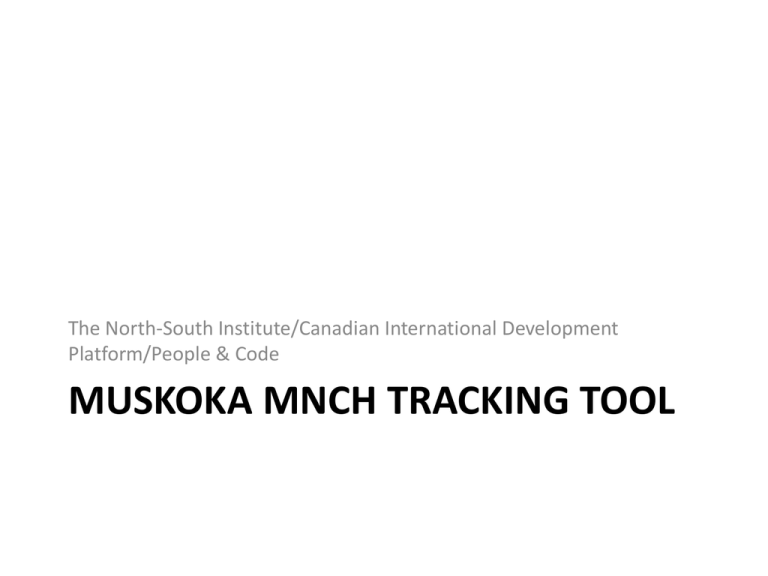
The North-South Institute/Canadian International Development Platform/People & Code MUSKOKA MNCH TRACKING TOOL The challenge(s) • Muskoka – MNCH is Canada’s signature foreign aid initiative, at $2.85bn over 5yrs (announced 2010) it makes up the single largest share of Canadian aid • The initiative has placed substantial emphasis on transparency/accountability from the start • Lot of very useful “open data” related to the initiative is available • But this is fragmented, across sources, format types • The complicated nature of the commitment ($1.1bn in “new” funding + $1.75bn in “baseline”) makes analysis challenging, despite open data • IATI doesn’t contain ‘marker’ or ‘coding’ for Musk/MNCH • Partner level traceability is not possible as no Canadian Musk/MNCH executing partner (currently) publishes to IATI • Impact/results info is at a general level (compared to partner info) The solution(s) • Work with a master list of Musk/MNCH unique IDs (across sources) to first conduct a meta analysis of data sources • Convert and link various data sources and types into one hub (e.g. MongoDB) to ready API for JSON access which would allow visualization (e.g. d3.js) – Sources: DFATD-IATI; DFATD-Open Data; IATI registry; IATI datastore – Types: XML, CSV; including manual upload to DB • Demonstrate visualization that enables: – – – – – – – Tracking commitments vs. actual expenditures (burn rate) Baseline vs. new funding breakdowns Network/cluster graph of partnerships (type of organization, CSO, multilateral etc.) Executing partners and organizations involved; subsectors/priorities Country level mapped view; with disaggregation to project level Results/impact Allow extensibility to new data feeds (e.g. interchange with Can-MNCH alliance data) Summary analysis • There are 687 unique projects overall, however: – If you only query current projects browser (DFATD open data) you will find 574 – Musk-MNCH browser has fewer – If you combine with historical (DFATD open data) you will find 496 – If you looked in current IATI you will only see 158 – There are differences in what info is available via which source • There are several good reasons for these differences (even though all are “open data” they have different ends); not just a problem of data joins, quality (there are some issues but not insurmountable) • Not only do sources have differences in the extent of coverage, but also in attributes (which fields are covered) • Overall, the initiative seems on-track, but it would be difficult to reach this assessment without triangulating various sources Summary analysis • Data currently allows coverage from 2010-11 to 201213 (prelim). • By year 3 (of 5) $1.77bn of $2.85bn has been spent (62.1%) – $1.15bn in baseline and $0.62bn in new • Vast majority of projects executed by foreign non-profit partners, i.e. multilateral agencies, directly through foreign governments; $1.13bn or 63.8% • Canadian non-profits are second largest exec partner $347mn –dominated by few large partners like Micronutrients I; Aga Khan; Care; Plan; Save – Several “nulls” and breaks in data yet to be worked out Recommendation • Given the small number of large partners (Canadian) involved, and an already established network (Can-MNCH alliance), Muskoka-MNCH implementers could be excellent candidate for IATI publication pilot – • • Canadian Musk-MNCH partners could play valuable role in enhancing IATI results tracking fields by leveraging their own results/impact ME systems to enrich IATI data (and possibly the wider schema) IATI publication would be better positioned as lessons/Knowledge-Sharing exercise (than accounting/reporting) – • • • Pilot could be worked into org work plans, could be limited (to start) to just Musk-MNCH projects In the process, IATI often reduces or eases other reporting burdens Official figures likely understate Canada’s contribution to global MNCH; not having complete picture of Canadian orgs resource allocation, investment, partnerships, we estimate, leaves out about 50% of the Canadian contribution Bringing this in view could enhance results & impact analysis, narrative and build further support for efforts Combination of open source tools, IATI data standard, community (tech, data, policy) support can make this happen Demonstration VISUAL MUSKOKA-MNCH TRACKING TOOL
